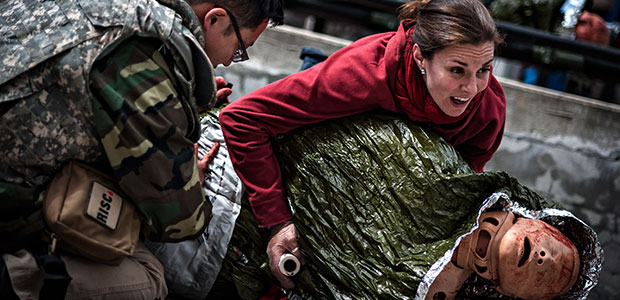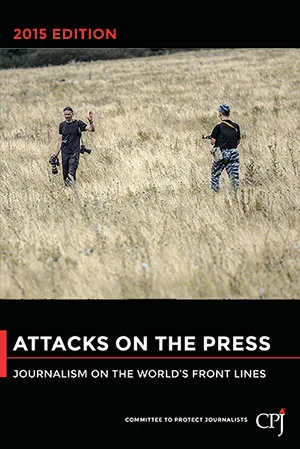The small room in the back of the Monsours’ house was set up for two people: two desks, two nightstands, and two beds. The beds had matching sheets and pillowcases adorned with Superman cartoon characters.
Jihad Monsour, 13, slouched on the edge of one of the beds. He used to share the room with his older brother, Ali, who was killed in their hometown of Al-Bab, Syria.
“Everything reminds me of him,” Jihad told me in an interview in Al-Bab in August 2012. Jihad was wearing a yellow collared shirt that his brother sported in a photo framed on a table across the room.
He told me that Ali was on his way to school for a tutoring session with a friend when the bullets hit him, one in the arm and one in the stomach. Propping his body up on the back of the bike, the friend rushed Ali to the local hospital for treatment. But Ali’s injuries were too severe. He was evacuated to a hospital in Kilis, Turkey, where he died on July 19, 2012.
I interviewed Jihad at a time when the Syrian civil war was shifting direction. President Bashar al-Assad’s forces were beginning to target the opposition stronghold of Aleppo. In many ways the opposition was still forming itself. The only well-known group that existed at that time was the Free Syrian Army, but it was not as organized as it is now. In the north it mostly consisted of groups of men living in the same neighborhood who formed their own battalions, acquired their own weapons, and threw themselves into the fighting without any coordination.
Not only was the battleground changing, but so, too, was the environment for journalists. In the summer of 2012, many staff reporters began to leave Syria. The fighting was becoming too fluid. Several journalists were kidnapped by unidentified groups of men who, we now know, were affiliated with Jabhat Al-Nusra (the Al-Qaeda offshoot in Syria), and some better-known reporters, such as Marie Colvin and Anthony Shadid, had died on the job. More and more news organizations began pulling their staff out of Syria, but they were still desperate for content from what would become one of the deadliest and geopolitically sensitive wars in history. Some organizations tried to hire local stringers to send photos and video footage, and others turned to a different alternative: freelance journalists. I was one of them.
At that time, interviews with local, average Syrians, many of whom were trying to avoid aerial bombardments and to, more or less, survive, were lacking in the global media sphere. That was my goal in reporting in Syria: to tell stories that people could connect with. I wanted to report on war without focusing on who was winning or who had acquired more weapons.
But I had never covered a war. I spent months reporting the Syrian crisis from its borders and filed dispatches dozens of times as a freelancer, but never from within Syria. My mentor, Anthony Shadid, who graduated from the same college and wrote for the same school newspaper, had pushed me to move to Cairo and pursue a career in journalism as he did after he graduated from the University of Wisconsin-Madison. When he died, there was no one in the profession to whom I could turn for advice about how to freelance in conflict zones. Some of the editors I worked with had started their careers in Bosnia, not as freelancers but as staff members. As I soon learned, the distinction between the two, especially in conflict zones, was important.
The Arab Spring, in many ways, was new territory for young freelance journalists. Never before had we reported on so many newsworthy stories in one region. And never before in recent history had coverage of a conflict depended to such an extent on people like us, who were often undertrained and lacked the backup an established news organization can provide.
Most of us were in our 20s and reported from Cairo. Some of us moved there to study Arabic; others studied on Fulbright scholarships. Living there was cheap, and the city offered flights to other Arab Spring countries for low prices. It was an ideal place in which to try to break into the profession.
All of the freelance journalists knew one another, and although many of us were competing for contract positions at the same news outlets we shared sources, contacts, and fixer recommendations.
We didn’t have any other choice.
Editors were not willing to provide us with any logistical guidance, let alone safety measures. Many of them offered no advice or guidance at all. There were, however, a few freelancers in the region who were older and had reported in war zones previously. One of these freelancers was Jim Foley, an incredibly talented writer and one of the only journalists willing to help me when I first started out.
Over time, this group of freelancers grew bigger and expanded east to Istanbul, where many moved after the ousting of President Mohamed Morsi in Egypt and still live today.
Lacking any formal structure, we developed social media groups through which to exchange information and offer advice on reporting in places such as Syria. We could not formally vet fixers, so we relied on one another for recommendations. We even rented out flak jackets to one another and passed them off in airport lobbies.
We did not have any official medical or security insurance. Some used the insurance that Reporters Without Borders offered, but many of us did not–it was another expense. Our only insurance was the knowledge that friends and family were keeping track of us as best they could on social media. When I was in Syria the first time I had an international data plan on my cell phone. If I drove far enough toward the Turkish border I could send a text message to my parents telling them that I was OK. One time I even had to file a story by way of text message. That was all I had, and often the service from cell towers crashed and I had no way to communicate. Satellite phones were not an option; they were too expensive.
Eventually we freelancers organized ourselves into a more formal support system. We enrolled in Sebastian Junger’s Reporters Instructed in Saving Colleagues (RISC) and signed up for the Frontline Freelance Register, co-founded by Anna Day, who often reports from Syria. Over time other freelance journalist support and advocacy groups emerged. Lauren Bohn, one of the only freelance journalists in Egypt during the revolution, started Foreign Policy Interrupted, a service dedicated to disseminating women’s reporting, much of it written by freelancers.
I am often asked by young aspiring journalists how to begin a career in journalism. Many of them fundamentally believe that the only way to start out is to move to a different country and start pitching stories. I tell them how I started my career but caution them that I do not know whether that is the correct answer to the question. The truth is, I think about whether I made the right choice reporting from places like Syria as a freelancer. I question some of the decisions I made and wonder what might have happened had I stayed longer. Jim Foley and Austin Tice were kidnapped only weeks after I left.
What I do know is this: Now there is space for an aspiring journalist to begin a career if he or she wants, but that career may have to begin with freelancing, especially if one wants to write internationally. In an industry that seems to constantly tell younger journalists to find other professions because there are no jobs left, the shrinking news staffs and increasing reluctance of many news organizations to put those that remain in harm’s way encourage the young journalist to take a big risk and begin a journalism career by delivering content from remote and often dangerous locations. In many ways these reporters go it alone, facing challenges ranging from physical attacks to cyberhacking to tell the story to the wider world.
Erin Banco is a Middle East correspondent for the International Business Times and a graduate of Columbia’s School of International and Public Affairs.

